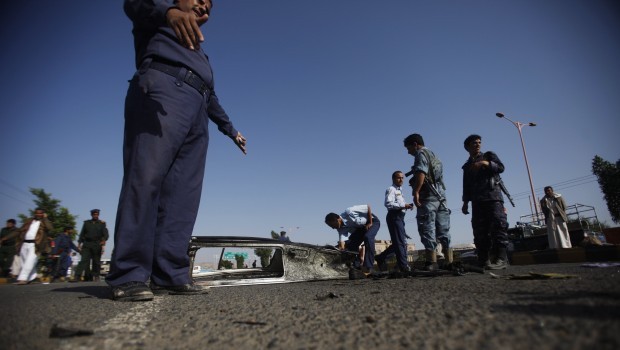
Air force troopers and policemen gather at the site of a bomb attack on a military bus in Sanaa August 25, 2013. (Reuters/Khaled Abdullah)
Sana’a, Asharq Al-Awsat—As the latest round of National Dialogue in Yemen grinds to a halt following the Southern Movement’s boycott of proceedings, Al-Qaeda-linked groups have stepped up their attacks on the country’s infrastructure and officials.
Two senior Yemeni officers were shot dead by unknown militants suspected of being affiliated to Al-Qaeda on Friday.
Chief of intelligence for the Wadia district along the Saudi borders, Col. Omar bin Amr, was shot three times in the head by assailants as he left a mosque in the Al-Qatn district of Hadhramaut governorate. His attackers fled the scene on a motorcycle, security sources reported.
In separate news, Col. Abdul Majid Al-Salami was killed as unknown gunmen shot him close to his home in the Al-Hawtah district in Lahij governorate, Reuters reported.
Speaking about the escalating violence ripping through the country, Yemeni presidential advisor Mahboub Ali told Asharq Al-Awsat that the “assassinations and explosions taking place in Yemen are not only a feature of the transitional period, they also occurred in the era of the former regime.”
“These incidents have been taking place over the past 20 years and perhaps throughout the history of the Yemeni revolution spanning the last five decades,” he said, adding that “all of these incidents and attempts will not dishearten the people of Yemen because they are taking firm steps to achieve a safe future.”
Ali said that the people of Yemen are “capable of overcoming any obstacle to national dialogues,” expressing confidence that these “deviant groups will come to their senses because Yemen, rather than any other country, is their tribe and shelter.” The term “deviant group” has often been government short-hand for Al-Qaeda.
In other developments, controversy continues to surround the Southern movement’s boycott of the National Dialogue Conference (NDC) at a time when the government has called on all the country’s political forces to return to the negotiating table.
Speaking to Asharq Al-Awsat on the condition of anonymity a Southern movement member said that all of the 85 southern representatives are set to hold a meeting in Sana’a on Sunday to decide whether to continue boycotting the conference.
The meeting will also demand that president Abd Rabbo Mansour Hadi enact an agreement previously made with the Southern Movement forming a 14-member negotiation committee consisting equally of 7 members from the north and south.
The Southern Movement official demanded that local, regional and international organizations launch an investigation into alleged crimes committed in south Yemen during the 1994 civil war.
The source also insisted that the Yemeni government should issue an official apology to the people of southern Yemen, particularly those in Sa’ada governorate, for its actions and stances over the past two decades.
Commenting on the Southern movement boycott, Mahboub Ali told Asharq Al-Awsat: “The success of the NDC is determined by the collective participation of all sides including the Southern Movement, Houthis and all of the Yemeni sides that were absent from the political arena in general in the past.”
